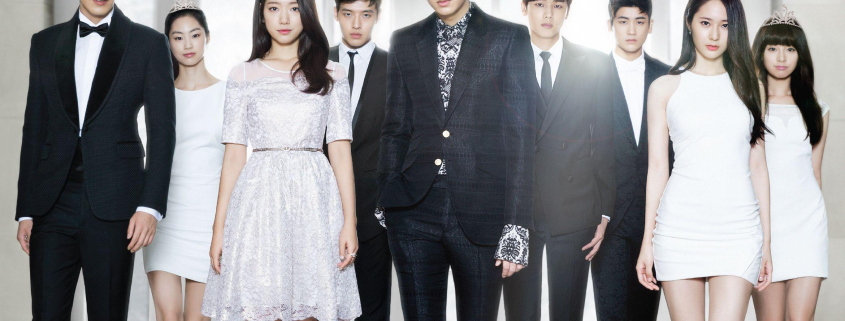‘The Heirs’ claims its Los Angeles birthright

I don’t quite remember how many times I’ve watched the 2013 K-drama series “The Heirs,” but I think I’m more invested in the characters than in myself. It’s my absolute favorite K-drama series and I will forever fight (figuratively, not physically) anyone who claims it doesn’t have a deeper meaning.
On the surface, “The Heirs” is similar to any teenage love story. There’s your ordinary Everygirl, Cha Eun Sang (Park Shin-hye), who wealthy conglomerate heir Kim Tan (Lee Min-ho) falls for during an accidental meeting in Los Angeles.
When both of them return to South Korea, however, Eun Sang begins attending the same elite school as Tan. The pair are polar opposites. He’s wealthy; she juggles multiple part-time jobs to support her struggling mother. The differences between them grow more evident as Eun Sang wrestles with the disapproval of Tan’s parents, as well as a competing love interest.
Only episodes one to four are actually set in L.A., but the city is the catalyst for the drama. Eun Sang and Tan first meet in L.A., and in the minimal time that Eun Sang and Tan spend together in the city, it serves as their emotional point of connection. While I could go on and on purely about the romantic aspect of it (and am always glad to do so), I want to talk about the narrative significance of L.A. for both characters. That requires providing some context.
Eun Sang is a financially struggling high school student who is told by her mother that her sister Eun Suk is getting married in the United States and needs money. Eun Sang is rightfully bitter at this. After Eun Suk left, Eun Sang took on the burden of supporting her family. Eun Sang decides she will personally take the money to Eun Suk. She doesn’t tell her mother that she dreams of staying in L.A. even after she’s given the money.
Tan has been exiled from South Korea and lives in L.A, as his older brother is afraid Tan will threaten him for a position in the family company. Tan’s waiting for the moment he can return home to South Korea, where his heart is.
For Eun Sang, the idea of going to L.A. begins as a dream. A tearful Eun Sang expresses her hope that she’ll become successful in the U.S. This moment demonstrates what I love so much about “The Heirs:” It’s a K-drama series that explores themes of class, but also this poignant idea of the American Dream and how sometimes it’s only an illusion.
For Eun Sang, L.A. serves as a means of escapism from the bleak realities of her life back home. She dreams of having a better life in the U.S. — L.A. and its glamour are essential to this.
Yet when Eun Sang arrives in L.A. and actually sees her sister Eun Suk, she finds that everything her sister told her about her shining life in L.A. was false. Eun Suk is struggling, financially and otherwise. In a particularly emotional confrontation, an angry Eun Sang condemns her sister’s lies. “You were my dream,” Eun Sang tells her.
Her sister tells her to turn a blind eye and then snatches all the money Eun Sang brought to support her “wedding.” As Eun Suk runs away, Eun Sang cries, “Mom worked so hard for that money!” In this moment, we see the carefully curated illusion of Eun Suk’s success versus the disappointing reality of it.
Tan, who has witnessed Eun Sang’s fight with her sister by accident, has a beautiful California beach house and attends a scenic high school. He lives the quintessential American Dream. However, Tan is deeply lonely and longs to be with his family in South Korea.
Both characters find the glamour of L.A. doesn’t hold any meaning for them. To me, they connect not just because of a shared language or culture, or because this is a K-drama and they have to, but because they have a shared experience of realizing this illusion. Beyond all the amazing L.A. sites depicted in the drama, L.A. is a place where dreams and reality conflict. It’s a phenomenon they’ve witnessed firsthand.
While I began watching the drama for the love story it advertised, I found myself thinking about my parents’ immigrant experience. Maybe I’m silly for reading so much into it, but I thought about my parents as Eun Sang, who comes to the U.S. hoping she’ll change her life and achieve the American Dream. I also thought about them as Tan, who, despite having that “shining” life on the outside, is homesick and doesn’t feel like he truly belongs in the U.S. I was reminded of my own dream of coming to L.A. and how it hasn’t quite been the illusion I crafted for myself.
Of course, there’s a more hopeful moment in the series. As Eun Sang prepares to leave L.A., she comments wistfully on her time there: “It felt like a midsummer night’s dream. I’m going to disappear now just like the dream I had last night.”
This line encapsulates how, in spite of all the difficulties the reality of L.A. presents, there’s something still so beautiful about spending time in the city. There’s a kind of magic in the L.A. illusion and living here. Maybe it’s not all that real. Perhaps it’ll even disappear at some point. For the moment though, it’s a dream. Believe in it.
Valerie Wu is a junior writing about film, television and visual culture in relation to Los Angeles. Her column, “Reel LA,” runs every other Monday.

